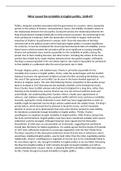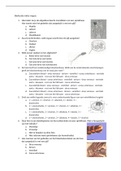What caused the instability in English politics, 1638-49?
Politics, being the activities associated with the governance of a country, refers, during the
period, to the actions of Charles I and parliament. Hence, the stability of politics relates to
the relationship between the two parties. During the period, the relationship between the
King and parliament changed drastically on three primary occasions: the summoning of the
short parliament in February 1640, the declaration of Civil War in August 1642 and the
execution of Charles I by parliament in January 1649. Since the execution of the King
removed half of the political system which had kept English politics in relative equilibrium
for centuries, it must be considered the most important demonstration of instability, and so
those factors which provoked the execution will be more significant to causing instability.
Charles and parliament were mainly responsible for the instability of politics during the
period, due to their clashing interests, but other factors, including the actions of the Scots
and the New Model Army made relations between these two parties tougher. Ultimately,
the King’s unwavering belief in his own divine right to rule made it impossible for parliament
to find stability in a settlement after the end of personal rule in 1640.
Through religious policy, and stubbornness, Charles is primarily responsible for the
instability that remains in English politics. Firstly, while the period begins with the Scottish
National Covenant, the agreement to fight to protect the Kirk, provoking the Bishops’ wars,
the root of this agreement and conflict can be seen in the heavy-handed approach of
Charles to religious policy. The riots that following Charles’ imposition of the Laudian prayer
book in Scotland in 1637 demonstrate the fortitude of beliefs of the Presbyterian Scots.
Since Charles chose Scottish advisors who had lived in England for a long time, rather than
listening to the Scottish privy council, Charles was very out-of-touch with the Scots and
acted blindly, not understanding their reaction. Hence, Charles poor appointment of
advisors, and stubborn religious policy sparked conflict with the Scots and hence instability.
Secondly, signing the Treaty of Berwick in June 1639 may have suggested that a return to
stability might be expected, but the King’s actions undermined the validity treaty. The King’s
private letters, which showed that he planned to break the treaty, and his immediate
decision to amass an army demonstrate that even when Charles seemed to seek stability,
his intentions consistently brough instability to English politics. Thirdly, Charles’
unwillingness to negotiate brought instability to English politics. With Charles captured by
the Scots and Parliament, English politics must have been considered unstable until a peace
settlement could be arranged. Although historians have argued that the Newcastle
Propositions of 1646 were an unreasonable set of demands, suggesting that parliament
should take the blame for failed negotiations, it is widely agreed that the Heads of Proposals
of 1647 were sufficiently moderate to encourage negotiation with the New Model Army.
The King’s rejection of this attempted settlement shows that the lack of settlement, which
would have stabilised English politics, was his fault rather than the other negotiating parties.
Additionally, Charles’ unwillingness to negotiate at his trial, due to his unshakeable belief in
his own divine right to rule, brought instability to English politics as he was killed. Removing
the King from English politics in 1649 certainly brought increased instability as it left an
unprecedented power vacuum. Hence, in allowing himself to be killed, rather than argue for
his life, Charles brought increased instability to English politics.





